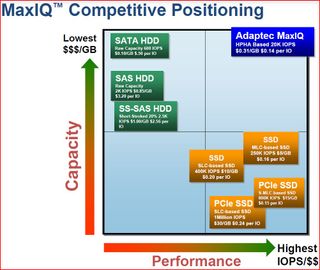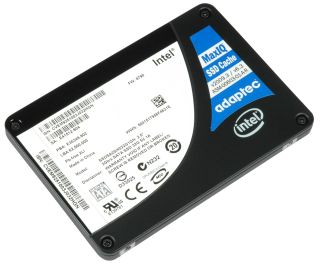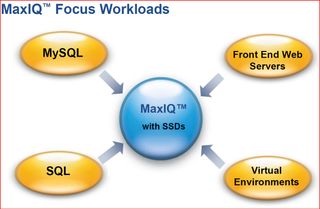Adaptec MaxIQ: Flash SSDs Boost RAID Performance
MaxIQ Details

Although this slide is taken from Adaptec’s MaxIQ presentation and the numbers are already a few months old, it still demonstrates how the storage market is divided today.
In the upper left-hand corner, you can see SATA hard drives, which are extremely cheap and offer significant storage capacities. SAS HDDs and short-stroked SAS HDDs (limiting capacities and drive heads’ operating ranges to maximize I/O performance) offer less capacity and more performance.

However, SSDs clearly dominate the performance side (lower right-hand). They offer many hundred times faster I/O performance, but at a cost that is often exorbitant. A single professional SSD can still easily hit the $1,000 mark. This is where MaxIQ wants to strike, combining the high I/O (read) performance of entry-level SSDs with the cost and capacity of hard drives.
The MaxIQ hardware solution is simple. You get a 2.5” Intel X25-E SSD and connect it to an available port on your Adaptec Series 5, Series 5Z, or Series 2 controller after installing the necessary MaxIQ firmware update. The SSD runs properly, despite its SATA 3 Gb/s interface, as the SAS protocol supports SATA tunnelling through SAS.
We will describe the configuration process on the following page, but let’s have a quick look at how exactly MaxIQ works.

Adaptec differentiates between so-called hot data (meaning all files that require frequent access) and cold data on the hard drive RAID array. Caching algorithms start placing data on the 32GB X25-E and make it available for accelerated read access. All cold data, as well as all write operations, are immediately routed to the hard drives.

The technology can only accelerate read operations today, but there are a few application scenarios that benefit a lot from increased read I/O. Great examples are database and Web servers. These typically get updated (written to) infrequently, but serve up frequent user access (reads). Adaptec says that write caching is on the development roadmap, as well. Please keep in mind that MaxIQ applies to I/O operations; a flash SSD would not be capable of accelerating sequential reads or writes.
Stay on the Cutting Edge
Join the experts who read Tom's Hardware for the inside track on enthusiast PC tech news — and have for over 25 years. We'll send breaking news and in-depth reviews of CPUs, GPUs, AI, maker hardware and more straight to your inbox.
Current page: MaxIQ Details
Prev Page MaxIQ Introduces SSD Caching To RAID Arrays Next Page Adaptec Storage Manager And MaxIQMost Popular

